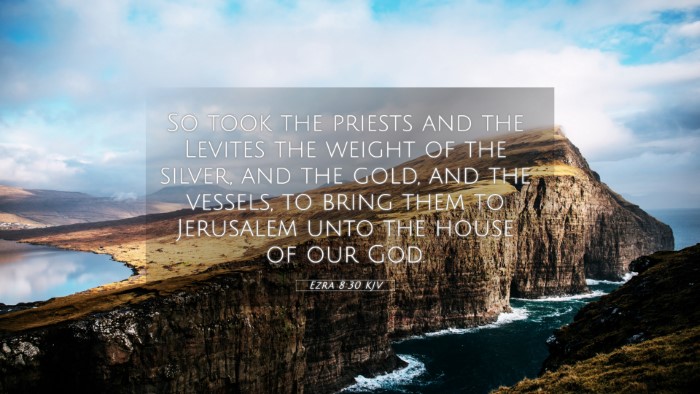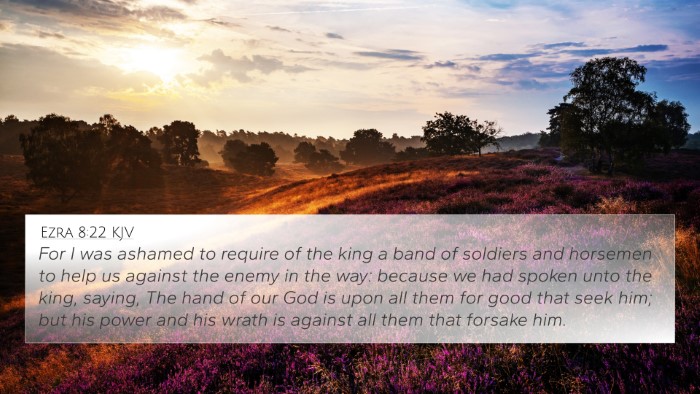Understanding Ezra 8:30
In Ezra 8:30, we find a crucial moment in the account of the return of the exiles to Jerusalem. This verse states:
“So took the priests and the Levites the weight of the silver and the gold, and the vessels, to bring them to Jerusalem unto the house of our God.” (Ezra 8:30)
Summary of Ezra 8:30
This verse highlights the responsibility of the priests and Levites in transporting valuable items—silver, gold, and sacred vessels—to the temple in Jerusalem. Matthew Henry emphasizes the significance of this act as a symbol of faith and obedience to God's command, illustrating the importance of stewardship over God’s blessings. The careful handling of these precious items reflects the seriousness with which the returning exiles regarded their task of re-establishing worship in Jerusalem.
Commentary Insights
- Matthew Henry: He interprets this part as a demonstration of trust in God, where the people show that they are committed to rebuilding the temple. The weight of the items signifies not only their physical heaviness but also the spiritual significance of what they are carrying back to their homeland.
- Albert Barnes: Barnes points out that the involvement of priests and Levites served to lend authority and sanctity to the act. Their role in the process signifies their importance in leading the community in worship and maintaining the purity of religious practices.
- Adam Clarke: Clarke remarks on the organization and structure displayed by Ezra in managing the return. The mention of weighing the valuables shows a careful approach to ensure that everything was accounted for, reflecting an organized and collective effort in restoring the temple services.
Thematic Cross-References
Ezra 8:30 connects with several other scriptures that emphasize stewardship, faith, and the temple's restoration:
- 1 Chronicles 29:3: David's contributions to the temple express a similar theme of giving for worship.
- Haggai 1:8: An exhortation to rebuild the house of the Lord emphasizes the priority of God's temple.
- Nehemiah 10:32-33: Offers insights into the faithfulness of the people to bring offerings for the house of God.
- Numbers 7:10-11: Discusses the offerings made for the dedication of the altar, establishing a pattern of sacrificial giving.
- Matthew 6:19-21: Jesus teaches about storing treasures in heaven rather than on earth, echoing themes of spiritual versus material wealth.
- Hebrews 13:16: Encourages sharing and good deeds as sacrifices pleasing to God, paralleling the themes of service introduced in Ezra.
- Malachi 1:8: Highlights the importance of bringing worthy offerings to the Lord, reflecting the seriousness of what the priests are carrying back to Jerusalem.
Tools for Bible Cross-Referencing
For readers and students of scripture looking to delve deeper into the connections within the Bible, several tools are available:
- Bible Concordance: An essential resource that lists words and phrases found in the Bible, helping to locate verses related to specific themes.
- Cross-reference Bible Study Guides: These guides provide structured paths to explore interconnected verses.
- Bible Reference Resources: Comprehensive indexes and online databases can aid in tracking related scripture.
- Cross-referencing Bible Study Methods: Using thematic analysis or verse comparison techniques enhances understanding of scripture connections.
Exploring Inter-Biblical Dialogue
Understanding Ezra 8:30 within the broader biblical narrative reveals many layers of meaning:
- Identifying Connections: Learning how themes from the Old Testament inform New Testament teachings can deepen comprehension and apply ancient wisdom to modern faith.
- Comparative Studies: Analyzing letters from Paul alongside the Old Testament can yield insights into how the early Church understood and utilized their scriptural heritage.
- Links Across Testaments: Noting the reflections of God's covenantal faithfulness through both Testaments enables a holistic view of scripture.
- Bible Cross-references for Sermon Preparation: Pastors and teachers benefit from leveraging these connections as they exposit the Word of God.
- Interpreting Themes: Using cross-references, one can explore themes such as obedience, faithfulness, and divine provision across different books of the Bible.
Conclusion
In summary, Ezra 8:30 captures a significant moment in the restoration narrative of the Israelites. The careful stewardship exhibited by the priests and Levites highlights themes of trust and dedication to God’s service. By examining this verse alongside various cross-references, believers can gain a richer understanding of their faith and the integral role of worship in the life of the community.
Additional Reflection
As readers delve into the meanings of scripture, utilizing tools for cross-referencing enhances their studies, allowing them to connect the dots across the vast landscape of the Bible. This method of linking Bible scriptures not only strengthens understanding but also deepens one's spiritual journey.






